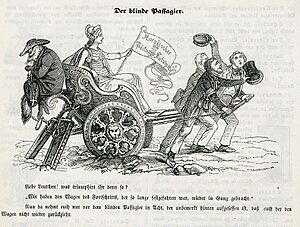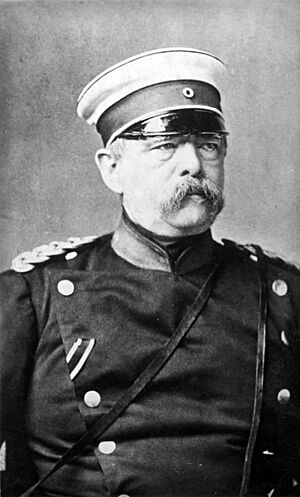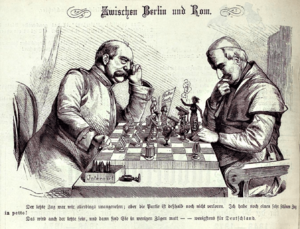- This page was last modified on 17 October 2025, at 10:18. Suggest an edit.
Kulturkampf facts for kids
The Kulturkampf (pronounced KUL-toor-kampf) was a big political fight in Germany from 1871 to 1878. It means "Cultural Struggle." This conflict was mainly between the Catholic Church in Germany, led by Pope Pius IX, and the Kingdom of Prussia, led by its powerful leader, Chancellor Otto von Bismarck.
The main disagreement was about who should control education and church appointments in Prussia. The government wanted more control, while the Catholic Church wanted to keep its traditional power. This struggle also had a sad side, as it involved unfair treatment of Polish people in Prussia.
Today, the word Kulturkampf is used to describe any big disagreement between a government and religious groups, or even between different groups of people with very different ideas and values.
Contents
Why the Fight Started
Europe and the Catholic Church
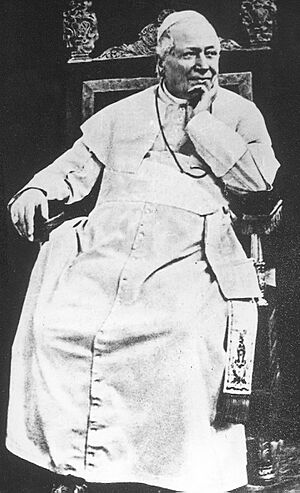
Pope Pius IX (around 1878)
For a long time, the Catholic Church had a lot of power in Europe. But new ideas from the Age of Enlightenment (a time of new thinking) and scientific discoveries started to change things. People began to believe that the government and the church should be separate. This meant the government would control public schools and other public matters, not the church.
The Catholic Church didn't like these changes. It wanted to keep its strong role in society, especially in areas like marriage, family, and education. The Church had lost much of its wealth and power over the years. The Pope, who leads the Catholic Church, even felt like a "prisoner" in the Vatican after losing his territories in Italy.
To regain influence, the Church started many new groups, newspapers, and schools. They also encouraged religious practices like pilgrimages. The Pope became a very important figure to many Catholics.
In the 1800s, Popes issued important letters called encyclicals. These letters often spoke against new ideas like freedom of the press and liberalism (which supports individual rights). In 1864, Pope Pius IX published a list of 80 "errors" called the Syllabus of Errors. This list rejected ideas like freedom of religion, separation of church and state, and civil marriage.
Then, in 1870, the Church held a big meeting called the First Vatican Council. Here, they declared a new belief: papal infallibility. This meant that when the Pope spoke officially on matters of faith and morals, he could not be wrong.
Many people, including some Catholics, were upset by these announcements. They saw them as a challenge to modern governments and a step backward. Governments wondered if Catholics would be loyal to their country or to the Pope first. For many, these new rules seemed like a declaration of war against the modern state and science.
Germany's Situation
Before 1871
Before Germany became one country in 1871, many German states had already started to separate church and state. For example, in the 1830s and 1850s, Prussia had disagreements with the Church about civil marriage and schools.
The Jesuits, a Catholic religious order, were seen as very loyal to the Pope. Because of this, they were banned or restricted in many German states, even in Catholic areas like Bavaria.
After the German revolutions of 1848–49, which the Church opposed, Catholicism became more involved in politics. This was because new liberal ideas clashed with the Church's traditional views.
In the wars that led to Germany's unification (like the Franco-Prussian War of 1870), the Catholic Church was against unification under Prussia. This made Bismarck, Prussia's leader, very suspicious.
The new Catholic beliefs, especially papal infallibility, were seen in Germany as a direct challenge to the new nation. Bismarck and the Liberals (a political party that supported modern ideas) saw the Catholic Centre Party as a problem because it strongly supported the Pope. Many German Catholics, however, were not happy about the Pope's infallibility rule, but most eventually accepted it.
Liberals in Germany thought the Church was old-fashioned and against progress. They were worried by the growing number of monasteries and convents. The Church, in turn, saw the Liberals as enemies of Christianity.
The Start of the Fight (1871–72)
When Germany became a united empire in 1871, about 62% of the people were Protestants and 36.5% were Catholics. Catholics were a majority in some parts of Germany, like Bavaria and the Rhineland. People of different religions often lived separately and didn't mix much. Protestants generally didn't trust the Catholic Church.
Bismarck believed the new German Empire was fragile. He saw the Catholic Church, along with France and Austria (both Catholic countries), as potential enemies. He thought there was a Catholic plan to threaten Germany.
The Centre Party was formed in 1870 to protect the Church's place in the new empire. Bismarck was concerned because many of its supporters, like the Poles and people from southern German states, were not fully supportive of the new empire. He saw the Centre Party as a threat to Germany's unity, especially because he believed Catholic priests were encouraging Polish nationalism.
Liberals saw the Catholic Church as a force against modern ideas, especially after the Pope's infallibility declaration. They wanted to reduce the Church's power. Bismarck agreed with this goal, as he wanted to weaken the Centre Party.
In 1872, Adalbert Falk became Prussia's minister for religion and education. Bismarck wanted Falk to make sure the state had more control over the Church. Falk, a lawyer, strongly believed in state authority. He became the main person behind the new laws of the Kulturkampf.
Key Laws and Events (1871–76)
From 1871 to 1876, the Prussian parliament and the German parliament (called the Reichstag) passed 22 laws as part of the Kulturkampf. These laws were mostly aimed at church leaders like bishops and priests. They made sure the state had more power than the Church.
Some laws were specifically for the Catholic Church, but general laws affected both Catholic and Protestant churches. As the Church resisted, the laws became stricter. Even some Liberals thought they went too far.
1871
- June 8: The Catholic and Protestant sections of the Prussian Ministry of Culture were combined. This meant the government would treat all religions equally, but also control them more.
- December 10: The Pulpit Law was passed. This law made it illegal for priests or other religious leaders to use their sermons (speeches in church) to talk about politics in a way that could disturb public peace.
1872
- January 22: Adalbert Falk became the Prussian minister for religious, educational, and health matters.
- March 11: The Prussian School Supervision Act was passed. This was a very important law. It removed the Church's control over primary schools, meaning priests could no longer oversee education or decide what was taught. The government now controlled schools. Bismarck believed this was needed because the Church was using schools to turn young people against the government.
- April: The Vatican (the Pope's government) rejected Germany's choice for ambassador to the Pope. In response, Prussia stopped its diplomatic relations with the Vatican.
- July 4: The Jesuit Law was passed. This law banned the Jesuits from Germany. They were seen as too loyal to the Pope and challenging the government's power. The law allowed the government to close Jesuit groups and expel their members. Other similar religious orders were also banned later.
- September 20: Prussian bishops protested against the new laws.
- December 23: The Pope spoke out, calling the new laws a "persecution" of the Church.
1873
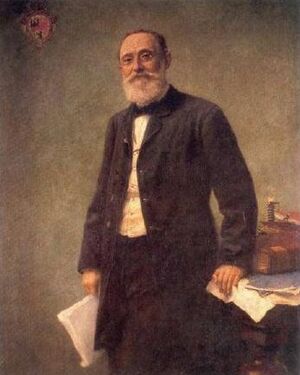
Rudolf Virchow, 1861
- January 17: The term Kulturkampf was first used. A politician named Rudolf Virchow said, "I am convinced that this is about a great cultural struggle." This term was then used by both sides.
- May 11–14: Four "May Laws" were passed. These were very strict:
* One law allowed people to leave the Church by simply telling a judge. This freed them from church fees. * Another law limited how the Church could punish its members. It couldn't affect their life, property, or freedom. * A third law created a Royal Court of Justice for Church Affairs. This court could judge church leaders and even remove bishops who didn't follow state laws. This meant the state had control over internal church matters. * The fourth law set new education rules for priests. They had to go to German high schools and universities for three years of theology. The state also had to approve all appointments of priests. This was to make sure priests were educated in a modern, secular way.
- May 26: Bishops told Catholics to peacefully resist these new laws. Many priests refused to cooperate, leading to fines, imprisonment, or exile.
1874
- March 9: A law was passed making civil registration (for births, marriages, and deaths) mandatory. This meant these events were recorded by the government, not just the Church.
- May 4: The Imperial Expatriation Law allowed the government to banish or expel priests who didn't follow the laws.
- July 13: A man named Eduard Kullmann tried to shoot Bismarck, but only injured his hand. Kullmann said he did it because of the church laws. This attack made the Kulturkampf even more intense.
1875
- February 5: The Pope declared the May Laws invalid.
- April 22: The Prussian Payment Law stopped government money for Catholic bishops and priests unless they agreed to follow all laws.
- May 31: The Prussian Congregations Law dissolved most religious orders within six months, except those caring for the sick.
- July 4: A law was passed allowing Old-Catholic communities (a small group that broke away from the Catholic Church) to use Catholic churches and cemeteries.
Ending the Fight (1878–1887)
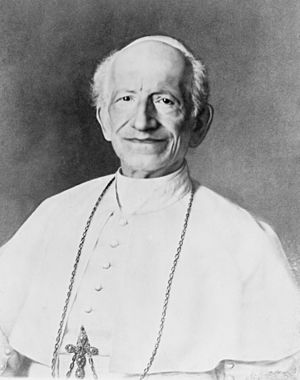
Pope Leo XIII (around 1898)
As time went on, Bismarck's focus shifted. He was more worried about the growing popularity of socialists and economic issues. He also realized that the Kulturkampf laws were not working as he had hoped. They were making the Catholic Centre Party stronger, not weaker.
When Pope Pius IX died in 1878, a new Pope, Pope Leo XIII, was elected. He was more willing to make peace. He wrote to the German emperor, expressing his desire for an end to the conflict.
Bismarck and the new Pope began direct talks. In 1879, Falk, the minister who had pushed for the strict laws, resigned. This was seen as a sign of peace. Slowly, the Kulturkampf began to end.
Several "mitigation" (lessening) and "peace" laws were passed until 1887:
- 1880: The First Mitigation Law allowed the government to resume payments to Catholic dioceses. Bishops no longer had to swear loyalty to Prussian laws.
- 1882: Prussia and the Vatican restarted their diplomatic relations.
- 1883: The Third Mitigation Law made many religious actions by bishops legal again. It also allowed the king to pardon some deposed bishops.
In 1885, Bismarck even asked the Pope to help settle a dispute between Germany and Spain. The Pope ruled in Spain's favor, and Bismarck accepted the decision. As a thank you, the Pope gave Bismarck a very high award, the Supreme Order of Christ. Bismarck was the only Protestant ever to receive it.
More peace laws were passed in 1886 and 1887. These laws allowed Catholic seminaries (schools for priests) to reopen and abolished state exams for priests. They also allowed most religious orders (except the Jesuits) back into Prussia.
On May 23, 1887, the Pope declared that the "struggle which damaged the church and was of no good to the state is now over."
While the fight officially ended, some key changes remained. Civil marriage and civil registration were still mandatory. The government still oversaw schools, and the Jesuits remained banned. The Catholic Centre Party was upset that the Pope made some agreements without consulting them. Many Liberals were also unhappy with Bismarck's concessions to the Church.
Even though the Centre Party grew stronger, the Church's political power in public life was greatly reduced.
What Happened Because of the Kulturkampf
The Kulturkampf had a big impact on Germany.
- The Catholic section of the Prussian government, which represented Catholics, was removed. This meant Catholics had less say at the highest levels of government.
- The strict government control over schools was mostly applied to Catholic areas, while Protestant schools were left alone.
The British ambassador, Odo Russell, noted that Bismarck's actions actually made Catholics more united and loyal to the Pope.
Most German bishops, priests, and ordinary Catholics refused to accept the new laws. They faced fines, trials, and imprisonment. By 1878, many bishoprics were empty, and over a thousand parishes had no priests. Nearly half of the monks and nuns left Prussia, and many monasteries were closed. Thousands of ordinary people were jailed for helping priests.
The Kulturkampf made Catholics more determined. Instead of violence, they used their votes. The newly formed Centre Party became a very strong force in the German parliament. It even gained support from non-Catholic groups who felt threatened by Bismarck's power.
The Centre Party doubled its votes in the 1874 elections and became the second-largest party. It remained powerful for the next 60 years. It became hard for Bismarck to form a government without their support.
Historians like Margaret Anderson say that the Kulturkampf taught German Catholics about democracy. They learned to use elections, parliament, and political parties to protect their church.
Anti-Polish Side of Kulturkampf
The Kulturkampf also had a strong anti-Polish side, especially in the eastern parts of Prussia where many Poles lived. Bismarck was known for being very hostile towards Poles. He believed that Polish people were a threat to German unity.
He saw the Kulturkampf as a way to weaken Polish national identity, which was often linked to the Catholic Church. Prussian authorities imprisoned many Polish priests, including Archbishop Mieczysław Halka Ledóchowski. Many other priests had to hide. Although some were later released, many emigrated. The anti-Polish parts of the Kulturkampf continued until World War I.
Kulturkampf in Other Places
Austria
Austria also had its own "Kulturkampf." It started even earlier, in the 1700s, when Emperor Joseph II wanted the state to be supreme in religious matters. He took control of many schools and dissolved monasteries.
Later, in 1855, the Catholic Church regained some rights in Austria. But in 1868 and 1869, new laws were passed that restored civil marriage and put primary and secondary education under government control. The Pope condemned these laws. This led to a serious conflict between the state and the Church in Austria. After the Pope declared infallibility in 1870, Austria completely canceled its agreement with the Church.
United States
In the United States, the term "culture war" is used to describe conflicts between religious conservatives and secular liberals, especially in the late 20th and early 21st centuries. These disagreements are often about social values and beliefs.
For example, in 1889, Wisconsin passed a law called the Bennett Law. It required all schools, public and private, to teach major subjects in English. German Catholic and Lutheran communities, who had many schools where German was used, strongly opposed this. The law was eventually canceled, but it caused big political changes.
The term "culture war" has also been used in US Supreme Court cases to describe deep disagreements over values.
Israel
In Israel, the term Milhemet Tarbut (meaning "culture war" in Hebrew) is also used. It describes similar conflicts between religious and secular groups in Israeli politics.
See also
- Culture war
- Kirchenkampf
- Freedom of religion

